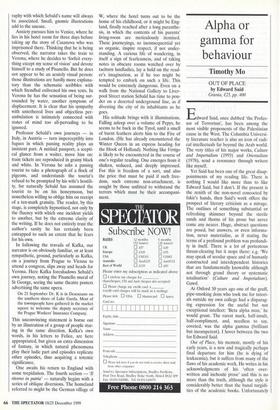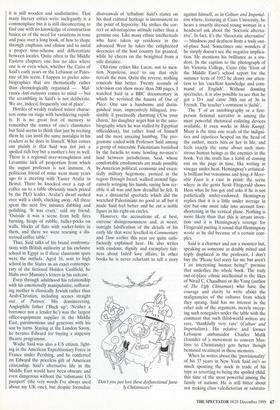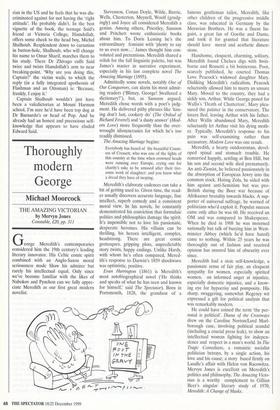Alpha or gamma for behaviour
Timothy Mo
OUT OF PLACE by Edward Said Granta, £25, pp. 400
Edward Said, once dubbed 'the Profes- sor of Terrorism', has been among the most visible proponents of the Palestinian cause in the West. The Columbia Universi- ty literature teacher is also an icon of radi- cal intellectuals far beyond the Arab world. The very titles of his major works, Culture and Imperialism (1993) and Orientalism (1978), send a resonance through writers like myself.
Yet Said has been one of the great disap- pointments of my reading life. There is nothing I would like more than to like Edward Said, but I don't. If the present is the zenith of the non-novel concocted by fakir's hands, then Said's work offers the prospect of literary criticism as a mirage. The outlines of something substantial or refreshing shimmer beyond the sterile sands and thorns of his prose but never come any nearer. Huge, abstract questions are posed, but answers, or even informa- tion, never materialise, as if stating the terms of a profound problem was profundi- ty in itself. There is a lot of portentous throat-clearing but it stops there: e.g. 'We may speak of secular space and of humanly constructed and interdependent histories that are fundamentally knowable although not through grand theory or systematic totalisation' (Culture and Imperialism). Gawd.
At Oxford 30 years ago one of the gruff, pipe-smoking dons who took me for tutori- als outside my own college had a disparag- ing expression for the useful but not exceptional intellect: 'Beta alpha man,' he would grunt. The rarest mark, half-insult, half-compliment, and, needless to say, coveted, was the alpha gamma (brilliant but incompetent). I hover between the two for Edward Said.
Out of Place, his memoir, mostly of his early years, is a new and tragically perhaps final departure for him (he is dying of leukaemia), but it suffers from many of the flaws of his academic work. He writes in his acknowledgments of his 'often over- written and inchoate prose' and this is no more than the truth, although the style is considerably better than the banal turgidi- ties of the academic books. Unfortunately it is still wooden and undistinctive. That many literary critics write inelegantly is a commonplace but it is still disconcerting to find one with no knowledge of construction basics, or of the need for variations in tone and pace over a long book, of how to shape through emphasis and elision and to instal a proper time-scheme and differentiate between locales. Quite often in the Middle Eastern chapters one has no idea where one is or even when, whether the Cairo of Said's early years or the Lebanon or Pales- tine of his teens. I happen to prefer auto- biographies that are thematically rather than chronologically organised — Mal- raux's Anti-mimoirs comes to mind — but the scrambling in Said's is not deliberate. We are, indeed, frequently 'out of place'.
Hordes of weakly realised minor charac- ters come on stage with bewildering rapidi- ty. It is no great feat of memory to remember the names of one's classmates but Said seems to think that just by reciting them he can instil the same nostalgia in his readers as he does in himself. What comes out plainly is that Said was not just a spoiled rich boy but a mother's boy as well. There is a regional over-wroughtness and Levantine lack of proportion from which the august professor is not immune. A politician friend of mine went many years ago tb a meeting with Yasser Arafat in Beirut. There he knocked over a cup of coffee on to a table obviously much prized by the PLO leader. Arafat's dwarf rushed over with a cloth, clucking away. All three spent the next five minutes dabbing and polishing. 'It was crazy,' said my friend. 'Outside it was a scene from hell: fires burning, heaps of rubble, bullet-pocks on walls, blocks of flats with rocket-holes in them, and there we were rescuing a dis- tressed coffee table.'
Thus, Said talks of his brutal confronta- tions with British authority at his exclusive school in Egypt as if these classroom spats were the intifada. Aged 16, sent to high school in the States as an exact contempo- rary of the fictional Holden Caulfield, he blubs over Mummy's letters in his suitcase.
Even through adulthood his relationship with his emotionally manipulative, suffocat- ing mother is classically Jewish rather than Arab-Christian, including scenes straight out of Portnoy. His domineeering, Anglophile father (Tuck up'; 'Neither a borrower nor a lender be') was the largest office-equipment supplier in the Middle East, parsimonious and generous with his son by turns. Staying at the London Savoy, he berates Edward for buying a sixpenny theatre programme.
Wadie Said was also a US citizen, fight- ing in the American Expeditionary Force in France under Pershing, and he conferred on Edward the priceless gift of American citizenship. Said's alternative life in the Middle East would have been obscure and even dangerous without the 'talismanic US passport' (the very words I've always used about my UK one), but despite formulaic disavoawals of 'tribalism' Said's stance on his dual cultural heritage is inconsistent to the point of hypocrisy. He strikes the cor- rect or advantageous attitude rather than a genuine one. Like many ethnic intellectuals who have taken up residence in the advanced West he takes the enlightened decencies of the host country for granted, while he cheers on the benighted from a safe distance.
Old-time critics like Lucas, not to men- tion Napoleon, used to say that style reveals the man. Quite the reverse, nothing conceals him better. Twenty seconds of television can show more than 200 pages. I watched Said in a BBC documentary in which he revisited the haunts of Out of Place. One saw a handsome and distin- guished man, impressively bilingual, irre- sistibly if practisedly charming ('Use your charm,' his daughter urges him in the auto- biography when he was stalled by Egyptian officialdom), but rather fond of himself and the most amazing humbug. The pro- gramme ended with Professor Said among a group of miserable Palestinians banished by the Israelis to some howling no-man's- land between jurisdictions. Said, whose comfortable emoluments are made possible by American political, economic and essen- tially military hegemony, proxied in the region through Israel, walked around figu- ratively wringing his hands, saying how ter- rible it all was and how dreadful he felt. It was a distasteful spectacle which did the wretched Palestinians no good at all but it made Said feel better and he cut a noble figure in his right-on circles.
However, the accusations of, at best, extreme disingenuousness and, at worst, outright falsification of the details of his early life that were levelled in Commentary and Time earlier this year are quite satis- factorily explained here. He also writes with candour, dignity and exemplary fair- ness about failed love affairs. In other books he is never reluctant to tell a story 'Don't you just love these dysfunctional fami- 6, Christmases?' against himself, as in Culture and Imperial- ism where, lecturing at Cairo University, he hears a smartly dressed young woman in a headscarf ask about the 'Socratic alterna- tive'. In fact, it's the 'theocratic alternative' — blindness and deafness from a truly out- of-place Said. Sometimes one wonders if he simply doesn't see the negative implica- tion. He mentions his brilliance as a stu- dent. In the caption to the photograph of his Victoria College, Cairo (the 'Eton of the Middle East') school report for the summer term of 1952 he draws our atten- tion to his 'excellent knowledge and com- mand of English'. Without donning spectacles, it is also possible to see that he got a D+ and came 20th out of 36 in French. The teacher's comment is faible'.
The 'I' of an autobiography or a first- person fictional narrative is among the most powerful rhetorical enlisting devices available. It even works in Mein Kampf. Many is the time one reads of the indigni- ties and injustices heaped on the head of the author, meets him or her in life, and feels exactly the same about such mon- strous human beings as the enemies in the book. Yet the truth has a habit of coming out on the page in time, like writing in vinegar under heat. Hemingway's artistical- ly brilliant but venomous and lying A Move- able Feast is a case in point: the scene where in the gents Scott Fitzgerald shows Hem what he has got and asks if he is not pathetically under-endowed. Hemingway replies that it is a little under average in size but one must take into account fore- shortening in the vertical plane. Nothing is more likely than that this is arrant inven- tion and it is Hemingway's revenge for Fitzgerald putting it round that Hemingway wrote as he did because of a certain com- plex.
Said is a charmer and not a monster but, speaking as someone as doubly mixed and triply displaced as the professor, I don't buy the 'Please feel sorry for me but aren't 1 an interesting human being?' premise that underlies the whole book. The truly out-of-place ethnic intellectual is the likes of Nirad C. Chaudhuri or Bo Yang (author of The Ugly Chinaman) who have the courage and clarity to write about the malignancies of the cultures from which they sprang. Said has no interest in the other side of the argument, merely sweep- ing such renegades under the table with the comment that such third-world writers are rare, 'thankfully very rare' (Culture and Imperialism). His relative and former Lebanese ambassador Charles Malik (founder of a movement to convert Mus- lims to Christianity) gets better though bemused treatment in these memoirs.
When he writes about the `provisionality' of his 37 years in New York Said isn't so much spouting the stock in trade of his type as reverting to being the spoiled child, this time of the most powerful among the family of nations. He is still bitter about not making class valedictorian or salutato-
rian in the US and he feels that he was dis- criminated against for not having the 'right attitude'. He probably didn't. In the best vignette of the book, the teenage Said's friend at Victoria College, Hamdollah, offers some cheek to the head boy, Michel Shalhoub. Resplendent down to carnation in button-hole, Shalhoub, who will change his name to Omar Sharif, marches them to his study. There Dr Zhivago cuffs Said twice and twists Hamdollah's arm to near breaking-point. 'Why are you doing this, Captain?' the victim wails, to which the reply (in a fully integrated apotheosis of Flashman and an Ottoman) is: 'Because, frankly, I enjoy it.'
Captain Shalhoub wouldn't just have been a valedictorian at Mount Harmon school, I'm sure he'd have been top dog at Dr Barnardo's or head of Pop. And he already had an honest and precocious self- knowledge that appears to have eluded Edward Said.
























































































































 Previous page
Previous page